calsfoundation@cals.org
God's Not Dead Series
God’s Not Dead is a Christian film series produced by Pure Flix Entertainment (later Pinnacle Peak Pictures) that spans five movies released from 2014 to 2024. What thematically unites the films is an underlying message that evangelical Christians in the United States continually face public ridicule and even legal persecution for the mere expression of their beliefs. Only the second and third movies in the franchise were filmed in Arkansas, and Arkansas was not even specified as the actual location of the movies until the third movie in the series, although an Arkansas flag can be seen in a courtroom scene in the second movie. Given that the state of Arkansas ranks high in terms of religiosity, especially of the evangelical Christian variety (being a state that elected a Baptist preacher, Mike Huckabee, to multiple terms as governor), the apparent prevalence of Christian persecution presented in these movies arguably does not accord with reality.
Inspired by the 2013 book God’s Not Dead: Evidence for God in an Age of Uncertainty by Rice Broocks, the first movie, God’s Not Dead, centers primarily upon a struggle of wills between Hadleigh University philosophy professor Jeffery Radisson (Kevin Sorbo) and student Josh Wheaton (Shane Harper). On the first day of class, Radisson demands that all his students sign a rather Nietzschean declaration that “God is dead,” which Wheaton, an evangelical Christian, refuses to do. Consequently, Radisson assigns Wheaton extra homework, from which his classmates are excused—namely, proving, over the length of the semester, the existence of God. Employing a number of sophisticated computer-animated presentations, Wheaton convinces his fellow students. They all collectively stand up near the end of the movie and declare that God is not dead, enraging Radisson, who later is run over by a car and dies. Wheaton, meanwhile, is publicly praised by Willie Robertson, of television’s Duck Dynasty fame, for standing up to Radisson at the Newsboys concert that ends the movie.
God’s Not Dead was filmed in Baton Rouge, Louisiana, and Houston, Texas, with a few exterior shots done in Los Angeles, California. Released in March 2014, the film proved immensely popular in evangelical circles, earning more than $64 million on a $2 million budget, but fared poorly with critics in general, many of whom found the characters to be two-dimensional. The film features several subplots involving characters who reappear occasionally throughout the series. In addition, a few people appear as themselves, such as the Newsboys, a Christian band responsible for the 2011 song “God’s Not Dead,” which reached gold status on the Billboard Christian charts; this song closes out each installment of the movie series. (In June 2025, following an exposé published by The Roys Report, former Newsboys lead singer Michael Tait, who had quit the band earlier that year, admitted to having abused cocaine and sexually assaulted other men; shortly thereafter, other allegations surfaced that he had sexually abused minors and had drugged a woman and watched as she was raped.)
The movie’s financial success led to immediate work upon a sequel, which was filmed in mid-2015 in central Arkansas. God’s Not Dead 2 features some of the same minor characters from the first movie, but this one centers upon high school history teacher Grace Wesley (Melissa Joan Hart), whose citation of a line of Christian scripture in her classroom results in a lawsuit against the school district by the American Civil Liberties Union (ACLU), representing two parents who object to their daughter being exposed to religion in any way in a public school classroom. The trial evolves into an effort to prove the historicity of Jesus Christ, the idea being that if Jesus was a historical figure, then discussion of him is a legitimate classroom activity. In the end, Wesley is exonerated.
God’s Not Dead 2 reportedly cost approximately $5 million to produce and earned $24 million worldwide, following its April 2016 release. Aside from being filmed in Arkansas, the movie also included Arkansas actress Natalie Canerday, and Mike Huckabee made a cameo appearance as himself.
The third installment of the franchise, God’s Not Dead: A Light in Darkness, was also filmed in central Arkansas and was the first movie to specify that the setting—the fictional community of Hope Springs—was in the state of Arkansas. This movie centers upon Pastor Dave Hill (played by David A. R. White, who also serves as producer of the film), a minor character from the first two installments, who leads a church located on the property of Hadleigh University. After a fire at his church, the university wants to exercise eminent domain and seize the property, and Pastor Dave enlists the help of his estranged brother Pearce (John Corbett) to oversee the legal struggle against the university. Unlike the previous movies, however, God’s Not Dead: A Light in Darkness was moderately praised by some critics even outside evangelical circles, with one writing that “it has a slightly more complex story, and actually interrogates some of the assumptions behind the stifling Christian persecution complex.” The movie, however, fared poorly at the box office, grossing only $7.4 million worldwide at the end of its theatrical run.
Diminishing returns, however, did not stop the production of the fourth movie, God’s Not Dead: We the People, which was filmed in Guthrie, Oklahoma, during the COVID-19 pandemic and saw theatrical release as a three-day-only Fathom Event in October 2021, earning a little more than $1 million during this brief run. This film reaffirms its Arkansas setting, with the homeschooling family at the center of the plot receiving a legal order from the “Commonwealth of Arkansas” (Arkansas is a state, not a commonwealth) ordering them to enroll their children in an accredited school or face steep fines and the possible nullification of their parental rights. Pastor Dave leads a group of parents to Washington DC, where they testify before a congressional subcommittee, populated largely by elitist secular types openly hostile to religion, about the value of homeschooling, the religious foundation of core American principles, and the compatibility of faith with reason. In the end, the homeschoolers’ testimony prevents the passage of a bill that would impose national education standards.
The fifth movie, God’s Not Dead: In God We Trust, was released in September 2024 and operates in some respects as a sequel to God’s Not Dead 2, with Ray Wise reprising his character of liberal lawyer Peter Kane. Too, the movie, like God’s Not Dead 2, was released during an election year that would see Donald Trump succeed in becoming president of the United States. And the message of God’s Not Dead: In God We Trust is explicitly political, with Hill now running for Congress as a last-minute measure to preserve an apparent conservative majority and regularly speaking about the necessity of infusing faith with politics and the necessity of Christians voting. His opponent, Kane, regularly proclaims religion to be a superstition superseded by Enlightenment values and scientific knowledge. In the end, Hill is elected to Congress. The movie, which was filmed in South Carolina, was released in 1,392 theaters and grossed approximately $3.2 million during its theatrical run.
The reception to the movies was largely negative in the few mainstream press sources that reviewed them, and evangelical and charismatic Christians themselves have been divided over both the quality of the films and their utility as tools of evangelization. As Blaine Charette writes in the Canadian Journal of Pentecostal-Charismatic Christianity, “How effective is an apologetic that is so self-congratulatory? The objective of these narratives is not to challenge Christians, as one finds so often in the New Testament, but to pander to and provide hollow comfort to the Christian audience. The films operate on the assumption that the world dislikes Christians. Given this type of portrayal, is it any wonder?” However, organizations such as Answers in Genesis, which promotes Young Earth Creationism, and Focus on the Family, a fundamentalist parachurch organization, have largely embraced the movies, finding their value more as a rallying cries for fellow believers than as tools of evangelism.
For additional information:
Charette, Blaine. “Rethinking Cultural Engagement: Reflections on the God’s Not Dead Franchise.” Canadian Journal of Pentecostal-Charismatic Christianity 8 (2017): 59–69. Online at https://www.academia.edu/70431449/Rethinking_Cultural_Engagement_Reflections_on_the_Gods_Not_Dead_Franchise (accessed June 11, 2025).
Dreyer, Courtney J. “The Right to Believe: Constructions of White Christian Victimhood in the God’s Not Dead Series.” Critical Studies in Media Communication 40, no. 4 (2023): 242–255. https://doi.org/10.1080/15295036.2023.2249076 (accessed April 15, 2025).
God’s Not Dead Official Movie Site. Pinnacle Peak Pictures. https://godsnotdead.com/ (accessed April 15, 2025).
Johnson, David Kyle. “God’s Not Dead as Philosophy: Trying to Prove God Exists.” Palgrave Handbook of Popular Culture as Philosophy, edited by Dean A. Kowalski, Chris Lay, and Kimberly S. Engels. https://doi.org/10.1007/978-3-319-97134-6_116-1 (accessed April 15, 2025).
Laroche-Joubert, Julien. “‘God’s Not Dead’ Is a Cinematic Portrayal of Trump’s Coveted Evangelical Voters.” Le Monde, September 3, 2024. https://www.lemonde.fr/en/summer-reads/article/2024/09/03/god-s-not-dead-is-a-cinematic-portrayal-of-trump-s-coveted-evangelical-voters_6724655_183.html (accessed April 15, 2025).
Pierce, Matthew. “Faithful Films: An Exploration of Habitus and Implicit Functionality in Recent Evangelical Cinema.” Honors thesis, Middle Tennessee State University, 2024. https://jewlscholar.mtsu.edu/server/api/core/bitstreams/f02883e0-d502-4a12-ab12-a56070d56cba/content (accessed April 15, 2025).
SDG. “The Queasy Appeal of ‘God’s Not Dead.’” Decent Films. https://decentfilms.com/articles/godsnotdead (accessed April 15, 2025).
Stamatellos, Rowan. “From Medieval to Modern: Deconstructing the Narrative of Christian Martyrdom.” LURe (Literary Undergraduate Research) 14 (Fall 2024): 39–48. https://lurejournal.com/wp-content/uploads/2025/02/lure2024finl.pdf (accessed April 15, 2025).
Vredenburgh, Steven. “Evangelizing Atheism: Missing the Mark in Recent Christian Film.” Christian Scholar’s Review 50 (Fall 2020): 61–84. Online at https://christianscholars.com/evangelizing-atheism-missing-the-mark-in-recent-christian-film/ (accessed June 11, 2025).
Wilkinson, Alissa. “Asking the Insufficient Questions.” Christianity Today, March 23, 2015. https://www.christianitytoday.com/2015/03/asking-insufficient-questions/ (accessed April 15, 2025).
———. “How the Christian Movie Series God’s Not Dead Fails to Be Christian.” Vox, April 3, 2018. https://www.vox.com/culture/2018/4/3/17180138/gods-not-dead-light-darkness-evangelical-christian-persecution-race (accessed April 15, 2025).
———. “I’m a Christian and I Hate Christian Movies.” Thrillist, March 30, 2016. https://www.thrillist.com/entertainment/nation/christian-movies-why-gods-not-dead-and-faith-based-films-hurt-religion (accessed April 15, 2025).
Staff of the CALS Encyclopedia of Arkansas
 Divergent Prosperity and the Arc of Reform, 1968–2022
Divergent Prosperity and the Arc of Reform, 1968–2022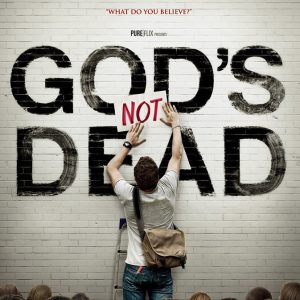 God's Not Dead Poster
God's Not Dead Poster 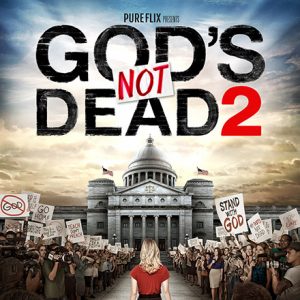 God's Not Dead 2 Poster
God's Not Dead 2 Poster 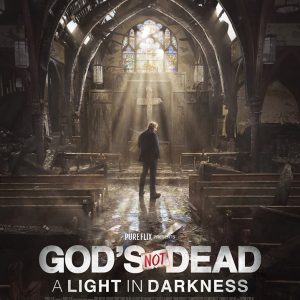 God's Not Dead: A Light in Darkness Poster
God's Not Dead: A Light in Darkness Poster 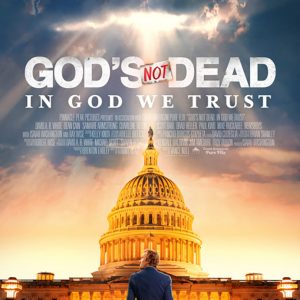 God's Not Dead: In God We Trust Poster
God's Not Dead: In God We Trust Poster 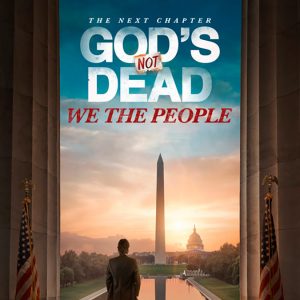 God's Not Dead: We the People Poster
God's Not Dead: We the People Poster 



Comments
No comments on this entry yet.